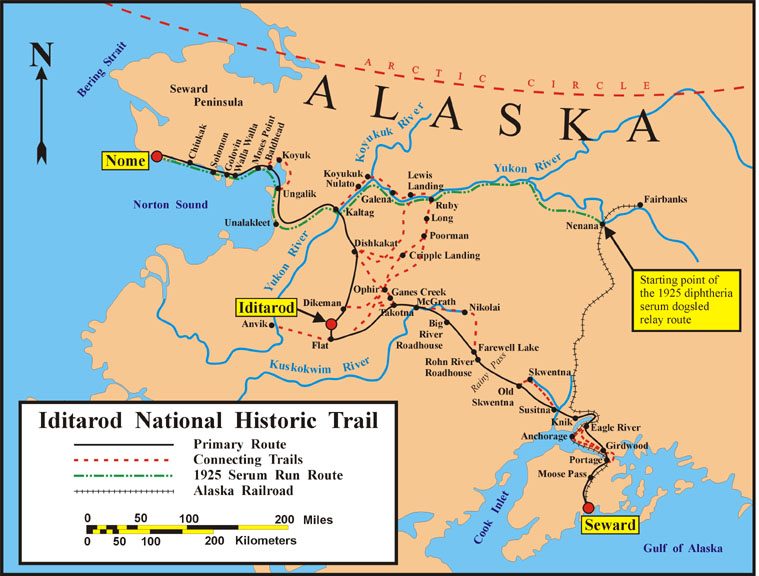thanks to Jack London
and my brother's good friend in Alaska.
I had no idea how long it was,
nor that there was prize money at the end.

As for the meaning of the word:
Iditarod is an Anglicization of the Ingalik Athabascan name for the river, Haiditirod or Haidilatna, which is probably an English version of the name of a village on the river, that may have corresponded with the village called Iditarod in the 1900s.
First, Iditarod is the name of a town in Alaska. According to Google Maps, the town of Iditarod is southwest of McGrath, southeast of Unalakleet and St. Michael, and northeast of other towns like Holy Cross and Aniak. According to the announcer at the Iditarod restart in Willow, Alaska on Sunday, the town of Iditarod is now a ghost town.
Next, the Iditarod Trail is historically known as the trail taken from Seward, Alaska to Nome, Alaska.
Also, the Iditarod River is a river in Alaska.

Michael Dinneen /AP
Iditarod musher Allen Moore and his team make their way through downtown Anchorage in the ceremonial start of the Iditarod Trail Sled Dog Race on Saturday. The actual race began on Sunday.
"Sixty-six mushers began their quest to win the Iditarod Trail Sled Dog Race with the competition's official start Sunday in Willow.
The mushers and their dog teams will spend about the next eight days traveling across nearly a thousand miles of Alaska wilderness in a sled, all trying to be the first musher to reach the old gold rush town of Nome.
The grandsons of Iditarod Trail Sled Dog Race's co-founder Joe Redington were the first and last mushers on the trail.
Ray Redington Jr. picked the first spot during the musher's draw. The 36-year-old musher is competing in his 11th Iditarod and finished in 7th place last year. He said he hopes to do even better this year.
Ray Redington said this year's competition is "tough, very tough," with the racing teams becoming more professional and serious about winning.
"They're getting better. So am I," he said Sunday.
His younger brother, 29-year-old Ryan Redington, is competing in his 8th race but had to wait to get on the trail after picking the last spot.
There are six former champions in the race, including last year's winner, 49-year-old John Baker of Kotzebue.
Baker said that after winning last year's race, he considered retiring as an Iditarod musher. But then he realized there were too many people counting on him to run again.
When he isn't training for the Iditarod, Baker spends his time traveling to Alaska villages and giving Native children a message: Work hard, follow your dreams, and you can do it.
If he had decided not to run this year, Baker said, "it would kind of be like quitting people."
Also in the race is Lance Mackey, whose string of four consecutive wins was ended by Baker in 2011.
Mackey admitted feeling deeply disappointed by his finish in last year's race, particularly after coming off four straight wins. He has said he won't let himself feel that way again, no matter what the outcome.
But Mackey also said his team this year is ready to race, and he's in it to win it.
"This team is as good as any team here," he said.
Also in the field is Hugh Neff, who won last month's Yukon Quest International Sled Dog Race.
Organizers are now saying the northern Iditarod route between Willow and Nome taken on even years is actually 975 miles, not as long as the 1,150 miles quoted in the past. However, some mushers believe the new estimate is too low and that the race is at least 1,000 miles.
Organizers cited various reasons for the mileage tweak, including the move of the competitive start north from Wasilla to Willow.
On Saturday, they added one mile back in. Last month, organizers decided to remove the Happy River Steps, a dangerous set of switchbacks between the Finger Lake and Rainy Pass checkpoints. However, officials recently said the alternate route, a winter road created by a mineral exploration company, was no longer a better option because of snow, and they went back to the Happy River Steps route.
The total purse is $550,000 for the first 30 finishers, with the winner receiving $50,400 and a new truck. A record purse of $875,000 was handed out in 2008. In past years, the winner's take was as high as $69,000."
via {NPR}

0 comments:
Post a Comment